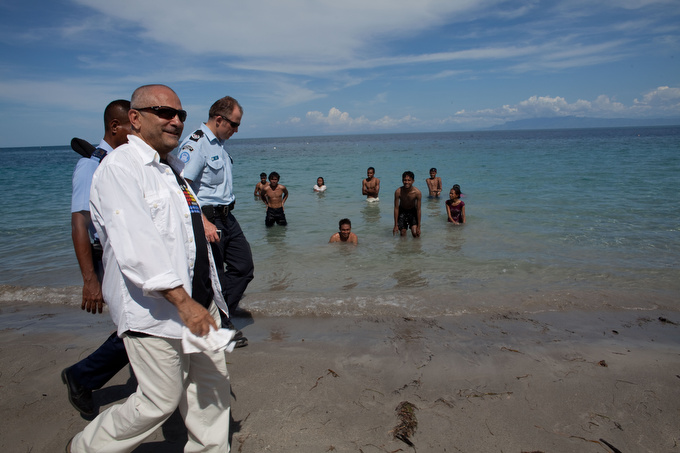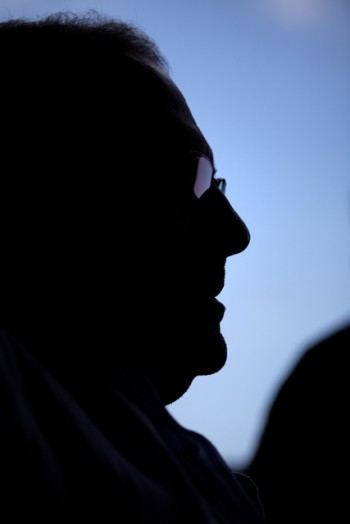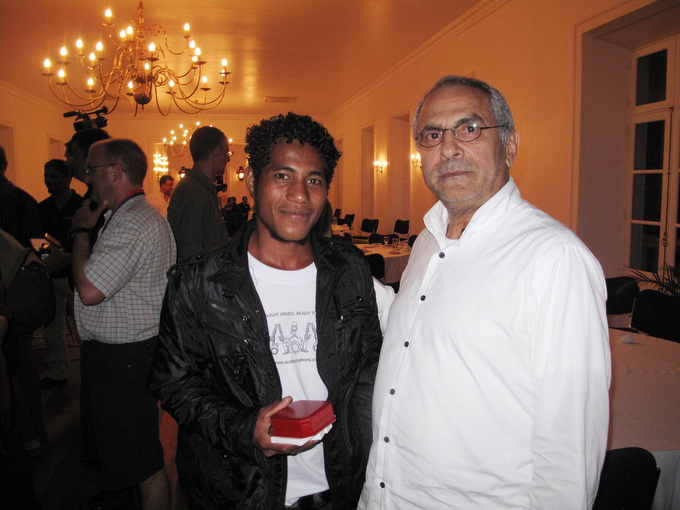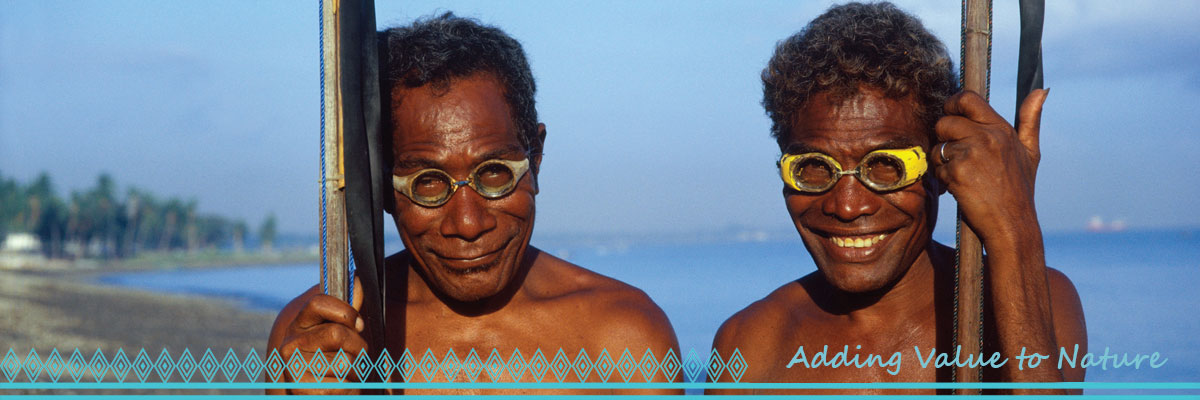
José Ramos-Horta is the 4th President of the Democratic Republic of Timor-Leste since the country’s unilateral proclamation of independence from Portugal in 1975 and the 2nd since the restoration of the independence from Indonesia in 2002, after 24 years of occupation (1975-1999). He was Prime Minister and Minister of Defense between July 2006 and May 2007, and Foreign Affairs Minister from 2002 to 2006. He is a Nobel Peace Prize Laureate.
Dr. Ramos-Horta’s priorities are to ensure that his people enjoy peace and security in a strong, prosperous, proud and democratic country. He is dedicated to eradicating poverty in his country through improved public health and education, and through provision of an environment where business can thrive to providing employment for his people.
At the same time he has been working towards the normalization of relations with Indonesia, developing relations with neighbours, and being an active participant of – but not uncritically – the United Nations system. He advocates UN reform at many levels, from its bloated bureaucracy to a new Human Rights Council truly representing human rights values.
José Manuel Ramos-Horta was born on December 26, 1949, in Timor-Leste’s capital, Díli. Of his eleven brothers and sisters, three were killed by the Indonesian military during the 24 years of occupation of Timor-Leste (1975-1999) and a fourth died due to lack of proper medical care, in November 1992.
With no university in the territory and few employment opportunities, José Ramos-Horta’s interest in current affairs led to a love for journalism. A loathing for the inequalities in his colonized homeland and awareness of self-determination movements in other Portuguese colonies led Ramos-Horta to ridicule Portugal’s “civilizing mission” in some of his newspapers articles. At the age of 18 he was deported by the Portuguese colonial administration from Timor-Leste to Mozambique, for two years (1970 – 1971).
With no university in the territory and few employment opportunities, José Ramos-Horta’s interest in current affairs led to a love for journalism. A loathing for the inequalities in his colonized homeland and awareness of self-determination movements in other Portuguese colonies led Ramos-Horta to ridicule Portugal’s “civilizing mission” in some of his newspapers articles. At the age of 18 he was deported by the Portuguese colonial administration from Timor-Leste to Mozambique, for two years (1970 – 1971).

Back in Timor-Leste, he and other young Timorese became involved in the development of political awareness in their country and, following the April 1974 “Carnation Revolution” in Portugal, they founded the organization which became the Frente Revolucionária de Timor-Leste Indenpendente, known as FRETILIN. On November 28, 1975, FRETILIN unilaterally declared Independence and established the Democratic Republic of Timor-Leste. The new government appointed the moderate José Ramos-Horta Minister of External Affairs and instructed him to go abroad to seek international recognition and support. He was only 25 years old.
José Ramos-Horta left Timor-Leste three days before the Indonesian troops invaded the Country – the 7th December 1975 – to plead the Timorese case before the United Nations headquarters, in New York, and urge for action. As the youngest diplomat ever to address the Security Council, Ramos-Horta’s presentations helped with the unanimous adoption of the resolution on December 22nd, 1975, which recognized the “inalienable right of the people of Timor-Leste to self-determination and independence”. While Ramos-Horta continued to work with FRETILIN, he resigned from the party in 1988, and has since remained an independent politician.
During his years in exile, José Ramos-Horta studied Public International Law at The Hague Academy of International Law (1983) and at Antioch University, where he completed an MA in Peace Studies (1984). He was trained in Human Rights Law at the International Institute of Human Rights in Strasbourg, France (1983). He completed post-graduated courses in American Foreign Policy at Columbia University, New York (1983) and he was a Senior Associate Member of St Anthony College, Oxford, England (1987). In 1998, Ramos-Horta attended the John F. Kennedy School of Government at Harvard University and completed the Executive Program for Leaders in Development. He would later be awarded 19 titles of Doctor Honoris Causa in Law, Political Sciences and Humanities.
In early 1991 – the year of the massacre at the Santa Cruz Cemetery – he became Special Representative to the National Council of Maubere Resistance (CNRM – Conselho Nacional da Resistência Maubere), the umbrella organization of pro-independence movements and activists inside and outside of Timor-Leste.
He was always in transit, except when teaching in Sydney, Australia, where he was directing a Diplomacy Training Program (DTP). The purpose of this program is to train indigenous people, minorities and human rights activists from the Asia Pacific region in the UN Human Right system. The DTP operates out of Sydney, but also conducts training across Asia.

On October 11, 1996, Dr Ramos-Horta was in his elderly mother’s house in Sydney, playing on the floor with his baby niece, when he was called to the phone to hear from a journalist that he had been named co-winner of the Nobel Peace Prize. Dr. Ramos-Horta didn’t believe the journalist, assuming it was a joke. He had expected the naming of Bishop Ximenes Belo, for whose candidacy he had been lobbying for several years. The Prize was not really for himself, he told the Media, but for all those who had fought in Timor-Leste – soon after his triumphal return to his homeland in December 1999, he presented his Nobel Peace Medal to FALINTIL, the Armed Forces for the Liberation of East Timor (Forças Armadas de Libertação e Independência de Timor-Leste). The Nobel Peace Prize award immediately opened doors for Dr. Ramos-Horta. The once “forgotten conflict” was before the world’s diplomatic community demanding a solution.
Almost three years later, on August 30, 1999, a Popular Consultation – referendum – was held with the Timorese voting for independence in overwhelming numbers. The local militias went on rampage of murder and destruction. Once again, Dr. Ramos-Horta took centre stage and tirelessly lobbied the UN Security Council, in New York, the White House, the US State Department, the US Congress, among many others, seeking enforcement for a multinational force to enter East Timor. On 19 October, the Indonesian Government ratified the referendum result and revoked Timor-Leste’s incorporation into Indonesia as the 27th Province. The UN officially assumed control of the territory on 25 October.
Dr. Ramos-Horta returned to his homeland for the first time after 24 years in exile. He played a preeminent role in building the institutions of the newly free nation. Between 12 July 200 and 20 May 2002 – when Timor-Leste officially regained its independence from Indonesia – Ramos-Horta acted as Minister of Foreign Affairs and Cooperation for the two provisional governments, both under the authority of the UN’s Transitional Administrator in East Timor (UNTAET), the Brazilian Sérgio Vieira de Mello.
Dr. Ramos-Horta was inaugurated as President of Timor-Leste in a ceremony held at the National Parliament, in Díli, on May 20, 2007. On February 11, 2008, President Ramos-Horta was shot twice in an assassination attempt that also targeted the Prime Minister, Xanana Gusmão. Evacuated to Australia, he remained for 10 days in an induced coma. Once fully recovered, he made his return to Díli, where he was received in triumph by an estimated 100,000 people of all ages and from all walks of life.

Major International Awards: 2008 – The Grand Collar of the Order of Prince Henry the Navigator, Portugal; 2004 – The Grand Cross of the Order of Rio Branco, Brazil; 2001 – Hollywood Film Festival Humanitarian Award, L.A.,US; 2002 – Golden Plate Award, Academy of Achievements, N.Y., US; 2000 – Gold Medal of the President of Italy; 1999 – First Hague Peace Appeal Award, Netherlands; 1998 – Gold Medal of the University of Coimbra, Portugal; 1998 -The Grand Cross of the Order of Freedom, Portugal; 1997 – Medal of the University of San Francisco, CA, US; 1996 – Nobel Peace Prize, Oslo, Norway; 1996 – First UNPO Freedom Prize, Netherlands; 1995 – International Peace Activist Award, Gleitsman Foundation, CA, US; 1993 – Professor Thorof Rafto Human Rights Award, Germany.
Read More in http://www.presidencia.tl/eng/a.html

